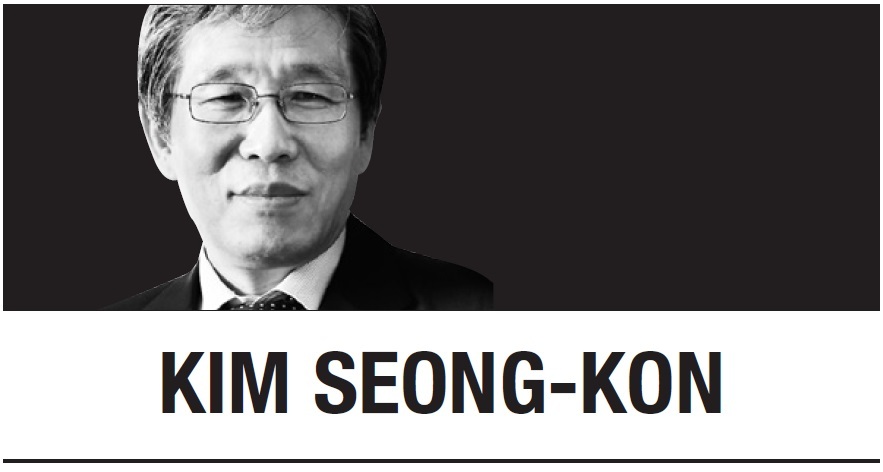[Kim Seong-kon] “Animal Farm” still appeals to us in 2019
By Kim Seong-konPublished : Oct. 29, 2019 - 17:14
 George Orwell’s “Animal Farm” is widely known as a satirical fable of the Russian Revolution of 1917. Although he was a democratic socialist himself, Orwell was deeply disillusioned by Stalin and communism, because in his eyes the Soviet Union hopelessly degenerated into a ruthless tyranny, a reign of terror and a cult of personality that worshipped its leader.
George Orwell’s “Animal Farm” is widely known as a satirical fable of the Russian Revolution of 1917. Although he was a democratic socialist himself, Orwell was deeply disillusioned by Stalin and communism, because in his eyes the Soviet Union hopelessly degenerated into a ruthless tyranny, a reign of terror and a cult of personality that worshipped its leader.Written in 1945, “Animal Farm” has become a classic today, frequently quoted when people criticize the hypocrisy and inherent problems of communism. A classic literary work is perennial. Indeed, while reading Orwell’s novel in 2019, one can be amazed by how it mirrors the current situation of the Korean Peninsula, where some of our politicians are still naively daydreaming of building a socialist utopia. Perhaps that is why several columnists have recently pointed out the similarities between “Animal Farm” and today’s Korean society.
In “Animal Farm,” Mr. Jones, who is presumably an allegory of the Russian Tsar, Nicolas II, runs the Manor Farm poorly. Old Major, who resembles Karl Marx, calls for a revolution against the irresponsible and incompetent Mr. Jones. After Old Major dies, two younger pigs, Snowball and Napoleon, lead the revolution, oust Mr. Jones and rename the place “Animal Farm.” Snowball tries to teach the animals how to be literate and to modernize the farm by building a windmill. Meanwhile, Napoleon builds his own private army by brainwashing young puppies with animalism.
Napoleon soon uses his loyal, vicious dogs to chase away his rival Snowball, accusing him of collaborating with Mr. Jones. This incident reminds the reader of Leon Trotsky’s forced exile and his subsequent death by an assassin sent by Stalin. After banishing his rival, Napoleon eliminates anyone who takes the side of Snowball under the excuse of purging the farm.
In addition, Napoleon unabashedly abolishes the revolutionary song taught by Old Major and invents an anthem that glorifies him instead. Moreover, to make himself appear as a heroic figure, Napoleon pretends that he is a war hero of the Battle of Cowshed that took place between the animals and Mr. Jones, who unsuccessfully attempts to retake the farm. The truth is that Napoleon was nowhere to be found during the battle.
By and by, Napoleon turns into a fearful dictator who forces the animals to worship him as if he were God. The novel narrates, “Napoleon was now never spoken of simply as Napoleon. He was always referred to in formal style as Our Leader, Comrade Napoleon.” Orwell writes, “It had become usual to give Napoleon the credit for every successful achievement and every stroke of good fortune. You would often hear one hen remark to another, ‘Under the guidance of our leader, Comrade Napoleon, I have laid five eggs in six days’ or two cows, enjoying a drink at the pool, would exclaim, ‘Thanks to the leadership of Comrade Napoleon, how excellent this water tastes!’
Initially, Napoleon and his gang declare that all humans are bad and therefore should be eliminated. However, Napoleon and his aides gradually resemble humans. They even begin walking with two legs. Earlier when they condemned humans, they chanted, “Four legs good. Two legs bad.” Now they claim, “Four legs good, two legs better!” Initially, they said, “All animals are equal.” Now they say, “All animals are equal. But some animals are more equal than others.” At the end of the novel, Napoleon renames the property back to its original name, “The Manor Farm.” He even plays cards with humans whom he has pretended to hate. In the eyes of the bewildered farm animals, pigs and humans are no longer distinguishable.
These scenes are so familiar to those who are living in today’s Korean Peninsula. For example, there are hypocrites who call for socialism and yet secretly relish capitalism. And there are those who promise a society where everybody is equal, and yet they believe that they deserve more privileges than others.
At the beginning of “Animal Farm,” pigs easily distinguish “us” from “them.” They say, “Whatever goes upon two legs is an enemy. Whatever goes upon four legs, or has wings, is a friend.” That is, if you do not belong to our camp, you are our enemy.
In her recent poem “A Room Where an Echo Echoes Another Echo,” Kim Seung-hee powerfully criticizes today’s Korean society: “Is there truth?/There is our camp only/Is there justice?/ There is our camp only/Is there proof?/There is our camp only/Have you seen truth?/I have seen our camp only/Whom do you protect?/Anyone who belongs to our camp/Whom do you oppose?/Anyone who does not belong in our camp/Why close the coffin in broad daylight?/Because it is good for our camp/Why not saying something different?/Because there is our camp only.”
It is a shame that our political leaders still do not understand what Orwell already realized in 1945.
Kim Seong-kon
Kim Seong-kon is a professor emeritus of English at Seoul National University. -- Ed.








![[Graphic News] More Koreans say they plan long-distance trips this year](http://res.heraldm.com/phpwas/restmb_idxmake.php?idx=644&simg=/content/image/2024/04/17/20240417050828_0.gif&u=)
![[KH Explains] Hyundai's full hybrid edge to pay off amid slow transition to pure EVs](http://res.heraldm.com/phpwas/restmb_idxmake.php?idx=644&simg=/content/image/2024/04/18/20240418050645_0.jpg&u=20240419100350)





![[From the Scene] Monks, Buddhists hail return of remains of Buddhas](http://res.heraldm.com/phpwas/restmb_idxmake.php?idx=652&simg=/content/image/2024/04/19/20240419050617_0.jpg&u=20240419175937)

![[KH Explains] Hyundai's full hybrid edge to pay off amid slow transition to pure EVs](http://res.heraldm.com/phpwas/restmb_idxmake.php?idx=652&simg=/content/image/2024/04/18/20240418050645_0.jpg&u=20240419100350)

![[Today’s K-pop] Illit drops debut single remix](http://res.heraldm.com/phpwas/restmb_idxmake.php?idx=642&simg=/content/image/2024/04/19/20240419050612_0.jpg&u=)